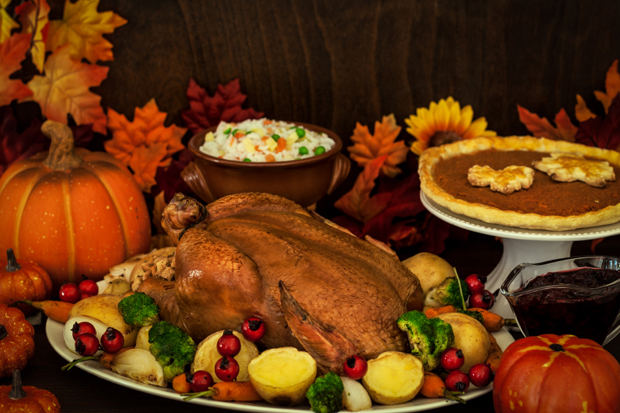I have always found Thanksgiving, which was celebrated in the United States last week, the most agreeable and least stressful of holidays. It involves no present-giving, so it is almost free of commercialism and the anxieties associated with shopping; and it has no religious or political connotations, which means it can be enjoyed in equal measure by Americans of every kind. Christmas, on the other hand, despite all the efforts made in America to play down its religious origins, retains an element of exclusivity about it: if you are not a Christian, it is not really your day. Thanksgiving, with its emphasis not only on gratitude but also on goodwill and generosity towards everyone, yet without the divisive intrusion of religion, is perhaps the ideal family festival for the modern world.
It is a holiday with rather confused origins. It was reputedly first celebrated by the Puritan settlers, who in 1621 landed in the Mayflower at Plymouth, Massachusetts, to give thanks for the harvest they reaped after their ferocious first winter on American soil. After that, it was observed sporadically on different dates in different states until Abraham Lincoln, without reference to the Pilgrim Fathers, decided in 1863 to declare the last Thursday in November a national day of thanks for his Civil War victories at Gettysburg and Vicksburg. It was an odd time to be giving thanks. The Union was bloodily divided and New York City was in the throes of draft riots. But the holiday survived and gradually rediscovered its supposed Pilgrim roots.
It is said that the Pilgrims ate four wild turkeys at their first Thanksgiving feast. Last week Americans ate more than 50 million farm-fattened ones. But the ‘Thanksgiving turkey’ is another tradition of quite recent origin, thanks largely to brilliant marketing by American turkey farmers. While some 90 per cent of American families now have turkey on their table at Thanksgiving, the turkey wasn’t widely accepted as the indispensable Thanksgiving dish until the middle of the 20th century. It was then, in 1947, that the National Turkey Federation formally presented a turkey to President Harry S. Truman, who started another tradition by deciding to ‘pardon’ it. This whimsical ceremony has taken place annually at the White House ever since, as it did again last week when President Obama pardoned not one but two turkeys that had been named ‘Abe’ and ‘Honest’ by Californian schoolchildren. ‘I know some folks think that this tradition is a little silly,’ he said. ‘I do not disagree.’
In Britain, of course, most of us eat turkey at Christmas and, thanks to people like Charles Dickens and the late Bernard Matthews, we tend to regard the turkey as quintessentially British. But it isn’t at all. Not only are turkeys everywhere basically American, all of them being descended from the wild turkey, an exclusively American bird; the British don’t even rank among the world’s biggest consumers of the fowl. Strangely, the Israelis eat more turkey per capita even than the Americans; and Britain’s consumption of turkey lags behind not only that of Israel and the United States but also of France, Italy and Germany.
However, we may soon catch up. I read in the Daily Telegraph that Thanksgiving is beginning to catch on in Britain too. Supermarkets have reported rocketing sales in November not only of turkey but also of other Thanksgiving specialities such as pumpkin pie, which, to my mind, is one of the most revolting dishes ever invented. Research based on these sales figures reaches the extraordinary conclusion that one in six Britons now celebrates Thanksgiving. There is nothing in the Thanksgiving tradition that is remotely relevant to Britain, except for the fact that it is thought to have been started by people who were desperate to get out of this country. So this suggests that we are simply addicted to celebrating as often as possible, even when we have nothing to celebrate. In fact, we like it better that way. We even do our best to drain Christmas of its meaning.
Got something to add? Join the discussion and comment below.
Get 10 issues for just $10
Subscribe to The Spectator Australia today for the next 10 magazine issues, plus full online access, for just $10.
You might disagree with half of it, but you’ll enjoy reading all of it. Try your first month for free, then just $2 a week for the remainder of your first year.













Comments
Don't miss out
Join the conversation with other Spectator Australia readers. Subscribe to leave a comment.
SUBSCRIBEAlready a subscriber? Log in